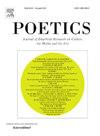Reconfiguring “Heritage hip-hop” From the scenes: Rightful youth rebellion and localised authenticity in the Huxiang Flow
IF 2
2区 社会学
0 LITERATURE
引用次数: 0
Abstract
This study builds upon the established frameworks of popular music heritage, scene theory, and Chinese hip-hop politics and authenticity, highlighting the intricate relationship between cultural heritage and hip-hop. Focusing on the localised genre the “Huxiang Flow” from Hunan province, it conducts critical discourse analysis of 98 song lyrics, music videos, and performances, alongside interviews with 20 local hip-hop audiences and practitioners. The research reconfigures “heritage hip-hop,” suggesting that artists leverage their cultural heritage as a strategic resource in their creative processes, thereby achieving nuanced self and local identities, articulating ideological expressions, and fostering emotional dialogues with audiences. Operating on the fringes of legitimate cultural channels, Huxiang flow artists employ elements like revolutionary historical figures and significant sites to enact legitimate resistance. They also utilise everyday environments to critique internal social divisions, shaping forms of everyday resistance through hip-hop, which resonates with local audiences and fosters collective consciousness. This study demonstrates heritage as dynamic to construct legitimate resistance in hip-hop music under Chinese cultural politics. Hip-hop artists are not merely representatives of marginalised groups but are influenced by localised cultural education, which underpins their creative work and informs their use of sophisticated rhetorical strategies to achieve legitimate resistance and promote social cohesion.
从现场重新配置“传统嘻哈”:沪湘流中正当的青年反叛与本土化的真实性
本研究建立在流行音乐传承、场景理论、中国嘻哈政治与真实性的框架之上,强调文化传承与嘻哈之间错综复杂的关系。以湖南本土的“湖湘流”为研究对象,对98首歌词、mv和表演进行了批判性话语分析,并采访了20位当地的嘻哈观众和从业者。该研究重新配置了“传统嘻哈”,建议艺术家在创作过程中利用他们的文化遗产作为战略资源,从而实现微妙的自我和地方身份,清晰地表达意识形态,并促进与观众的情感对话。在合法文化渠道的边缘,湖湘流艺术家使用革命历史人物和重要遗址等元素来进行合法的抵抗。他们还利用日常环境来批判社会内部的分裂,通过嘻哈塑造日常抵抗的形式,与当地观众产生共鸣,培养集体意识。本研究证明,在中国文化政治背景下,传承是嘻哈音乐建构合法抵抗的动力。嘻哈艺术家不仅是边缘化群体的代表,而且还受到当地文化教育的影响,这些文化教育支撑着他们的创造性工作,并指导他们使用复杂的修辞策略来实现合法的抵抗,促进社会凝聚力。
本文章由计算机程序翻译,如有差异,请以英文原文为准。
求助全文
约1分钟内获得全文
求助全文
来源期刊

Poetics
Multiple-
CiteScore
4.00
自引率
16.00%
发文量
77
期刊介绍:
Poetics is an interdisciplinary journal of theoretical and empirical research on culture, the media and the arts. Particularly welcome are papers that make an original contribution to the major disciplines - sociology, psychology, media and communication studies, and economics - within which promising lines of research on culture, media and the arts have been developed.
 求助内容:
求助内容: 应助结果提醒方式:
应助结果提醒方式:


